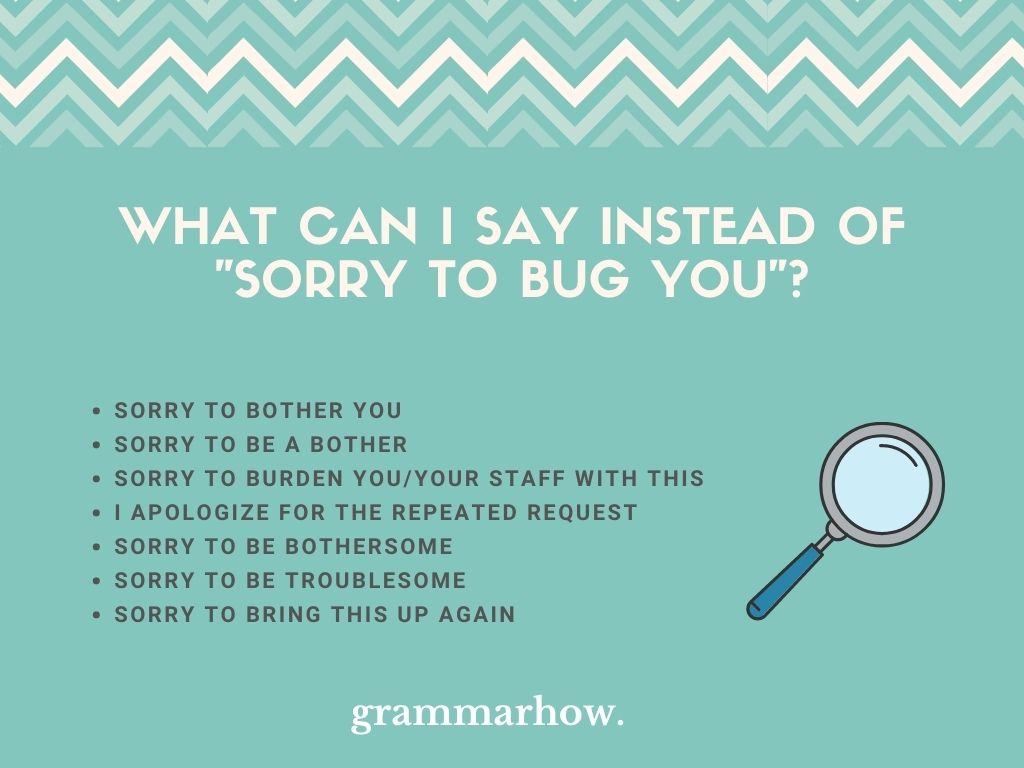Sorry to Bother You Again With This Problem but
"Sorry to bug you" works as a phrase informally. We can use it whenever we want to apologize for taking up someone's time with a matter. However, it doesn't work quite as well with formal situations. This article will explore the more suitable options.
What Can I Say Instead Of "Sorry To Bug You"?
There are plenty of better and formal options out there to replace "sorry to bug you." Some of the best ones that we'll share are:
- Sorry to bother you
- Sorry to be a bother
- Sorry to burden you/your staff with this
- I apologize for the repeated request
- Sorry to be bothersome
- Sorry to be troublesome
- Sorry to bring this up again

The preferred version is "sorry to bother you." "Bother" is the most suitable formal replacement for "bug" when we want to apologize for taking someone's time away from another matter. It's also one of the most commonly used phrases in emails within a working context.
Sorry To Bother You
Let's start with the best version we can think of. You can't go wrong with this phrase.
"Sorry to bother you" works well when we're trying to apologize for potentially wasting someone's time. If we think the task is below them, or we think we could have solved it ourselves but can't figure out, "bother" works really well.
"Bother" shows that you appreciate their valuable time, but you couldn't find any other way to solve your issue.
Here's how you might use it in an email format:
- Dear Mr. Saracen,
- I'm sorry to bother you about this, but I have something that I need your attention for.
- Kind regards,
- Mrs. Hendrix
- Dear Mr. Banner,
- Sorry to bother you again, but you didn't get back to me after my last email!
- Yours sincerely,
- Mrs. Page
- Dear Mrs. Penelope,
- Sorry to bother you, as I know your time is valuable. I've attached the document that I'd like for you to sign,
- Thank you,
- Mr. Pickens
Sorry To Be A Bother
We could also swap the order of the first phrase round slightly to come up with this one.
"Sorry to be a bother" works in the same way as above; we've just changed the order. We can use "bother" as an adjective here to describe ourselves as a person who is wasting someone else's time. Again, it's a useful way to show you respect the time of the person you email.
Here's how you might use it:
- Dear Mr. Cargo,
- Sorry to be a bother, but would you care to take a look at my newest project?
- Kind regards,
- Mrs. Hammie
- Dear Mr. Congo,
- Sorry to be a bother again, but I haven't heard back from you yet.
- Let me know what you thought about my previous email,
- Mrs. Murdock
- Dear Mrs. Swan,
- Sorry to be a bother, but this is very important to me.
- Thanks,
- Mrs. Stacy
Sorry To Burden You/Your Staff With This
We might be able to use a few different pronouns here based on the person or people we're directing the email toward.
"Sorry to burden you with this" is a great phrase to use. "Burden" is a great and formal word to replace "bother." It shows that we appreciate they might already have a large workload, and we're only adding to the problem. However, we would still appreciate their help.
Here's how we can use it appropriately:
- To whom it may concern,
- Sorry to burden you again, but you never responded to my last letter.
- Yours faithfully,
- Sarah Walters
- Dear Mr. Smith,
- Sorry to burden your staff with this, but I requested that you fix the issues within the company before I come back, and it has not been fixed yet.
- Kind regards,
- Mr. Smithers
- Dear Mrs. Magson,
- Sorry to burden you with this, but I think you need to hear what I have to say.
- Thank you,
- Mr. Horason
I Apologize For The Repeated Request
Sometimes, we might also want to change "sorry" into another form. This could keep our emails a little more unique and less samey.
"I apologize for the repeated request" works when we want to try a different route and use "apologize" instead of "sorry." The "repeated request" shows that we've already asked for help, but we haven't received it yet. It's a polite way to raise a formal complaint about something.
You could write it as follows:
- Dear Jack,
- I apologize for the repeated request, but my computer still seems to be playing up.
- Let me know when works best for you to take a look at it,
- Mrs. Marge
- Dear Mr. Hunter,
- I apologize for the repeated request, but the issue is still there.
- Kind regards,
- Mr. Termin
- Dear Dr. Jewel,
- I apologize for the repeated request, but I've run out of the thing you provided me.
- Thank you so much,
- Mrs. Stark
Sorry To Be Bothersome
We could even change the verb "bother" into an adjective. It's less common, but it works well in many cases.
"Sorry to be bothersome" works when we want to describe ourselves as "bothersome." We use this to show that we understand our request might be annoying, but we still need someone's help with it nonetheless.
We could use it as follows:
- Dear Mr. Evans,
- Sorry to be bothersome, but I need help with this.
- Yours sincerely,
- Peter Pit
- Dear Tamara,
- Sorry to be bothersome, but I'm still in need of some assistance.
- Thank you,
- Craig Howard
- Dear Mrs. Turbo,
- Sorry to be bothersome again, but the issue hasn't been resolved.
- Kind regards,
- Mat Parker
Sorry To Be Troublesome
We could try a different adjective like "troublesome" if we use "bother" or "bothersome" too much in our writing as well.
"Sorry to be troublesome" works in the same way as above. "Troublesome" and "bothersome" are synonymous, and we can use either to show that we respect the other person's time, and we don't mean to waste it.
Here's how one would use it:
- Dear Mrs. Magcargo,
- Sorry to be troublesome, but he hasn't arrived at the time you said he would.
- Kindly let me know what happens next,
- Mrs. Ferris
- Dear Ma'am,
- I'm sorry to be troublesome, but I do not believe you gave me the correct contact details for them.
- Thank you,
- Mr. Gerald
- Dear Sir Lance,
- I'm sorry to be troublesome again, but I appear to have lost the documents you gave me.
- Kind regards,
- Dr. Arthurson
Sorry To Bring This Up Again
Finally, let's look at "bring this up" as a phrasal verb. It works when we've already raised an issue, and let's see how it works in practice.
If we've already raised an issue to someone, "sorry to bring this up again" is a polite way to raise it again. It works best when the person hasn't directly addressed our issue, and we're still experiencing it. It's another good way to raise a formal and polite complaint.
While not an outright complaint, saying something like this lets the recipient of our email know that we're not overly pleased with the issue. When left unresolved, an issue can be difficult to work around, especially if we've already drawn attention to it.
Here's what you can do with it:
- Dear Mr. Parker,
- I'm sorry to bring this up again, but you still haven't gotten around to it.
- Thank you,
- Mrs. May
- Dear Mr. Rogers,
- Sorry to bring this up again, but I have not received my delivery.
- Kind regards,
- Mrs. Carter
- Dear Mrs. Roma,
- Sorry to bring this up again, but you have not responded to the last three emails.
- Kind regards,
- Mr. Televe
What Does "Sorry To Bug You" Mean?
While it's great to know all about the alternatives available to us, we still haven't covered the overall meaning of the original phrase. If you're struggling with what it means, this section is for you.
"Sorry to bug you" means that we're sorry to waste somebody's time with something they might not have time for. It could be related to something we've already discussed before or something that we think isn't worth their time.
However, when we need somebody's help (usually a boss's or a colleague's), we might have to ask them for it. Sometimes, we might be hesitant because we're unsure whether we might be able to do whatever the task is for ourselves.
It's also common to see the word "again" crop up with the phrase (i.e., "Sorry to bug you again"). This is especially apparent in any case where you have already raised the same issue to the same person before.
What Is The Difference Between "Sorry To Bug You" And "Sorry To Bother You"?
Finally, let's look at a comparison between "sorry to bug you" and "sorry to bother you." After all, we selected "bother" as the more appropriate choice in the workplace. Therefore, we should back up our claim with some evidence.
According to Google Ngram Viewer, "sorry to bother you" is vastly more popular than "sorry to bug you." However, both phrases mean the same thing, which shows that "Bother" is much more suitable in most cases than "bug."

You might also like:
Sorry For Bothering You vs. Sorry To Bother You (Meaning & Alternatives)
6 Steps To Politely Remind Someone To Reply To Your Email
Source: https://grammarhow.com/sorry-to-bug-you/
0 Response to "Sorry to Bother You Again With This Problem but"
Publicar un comentario